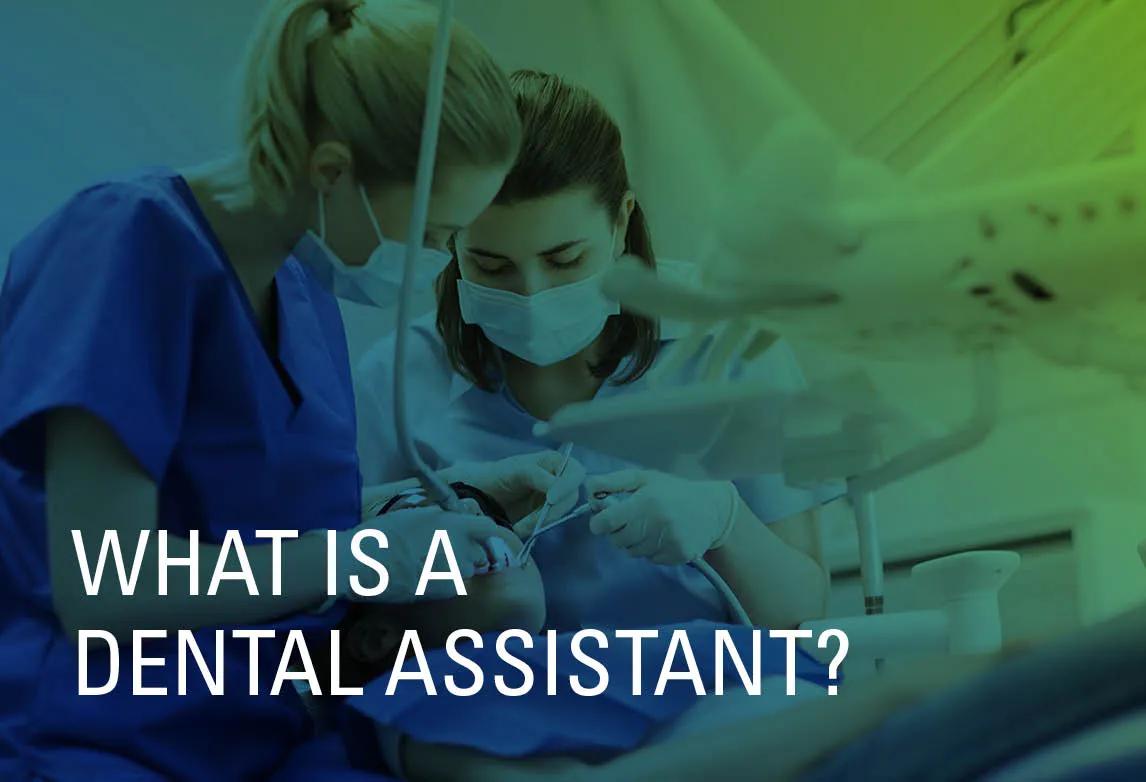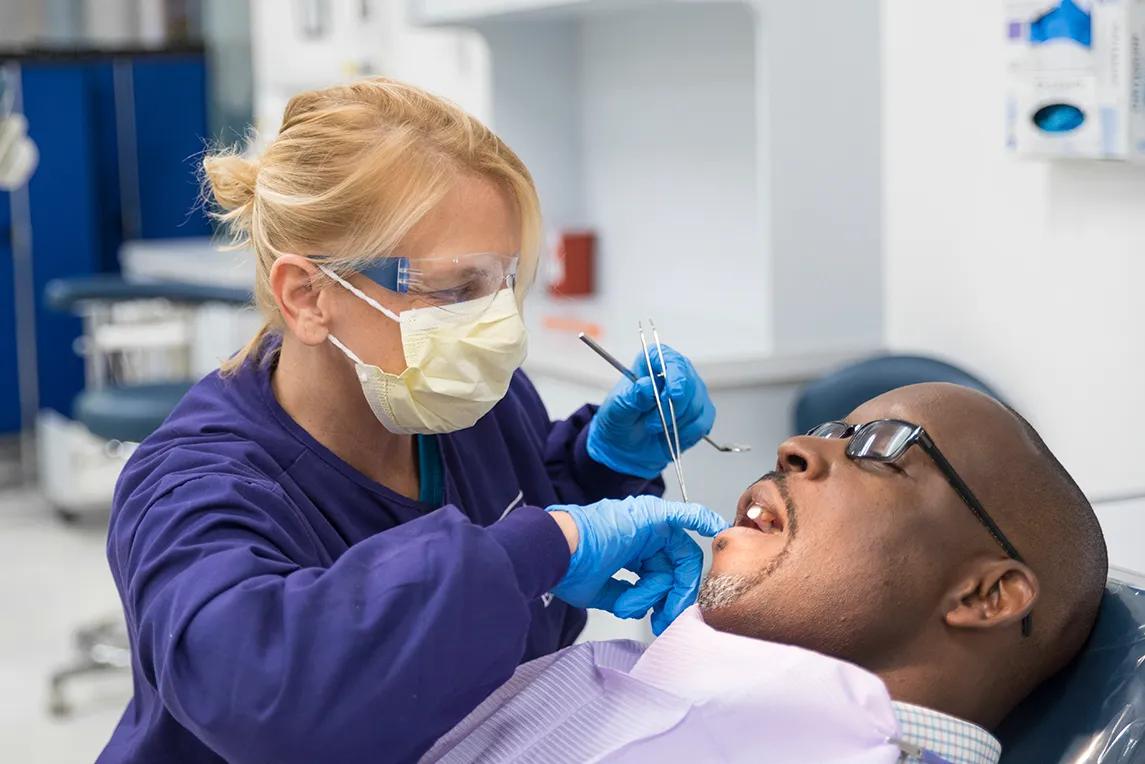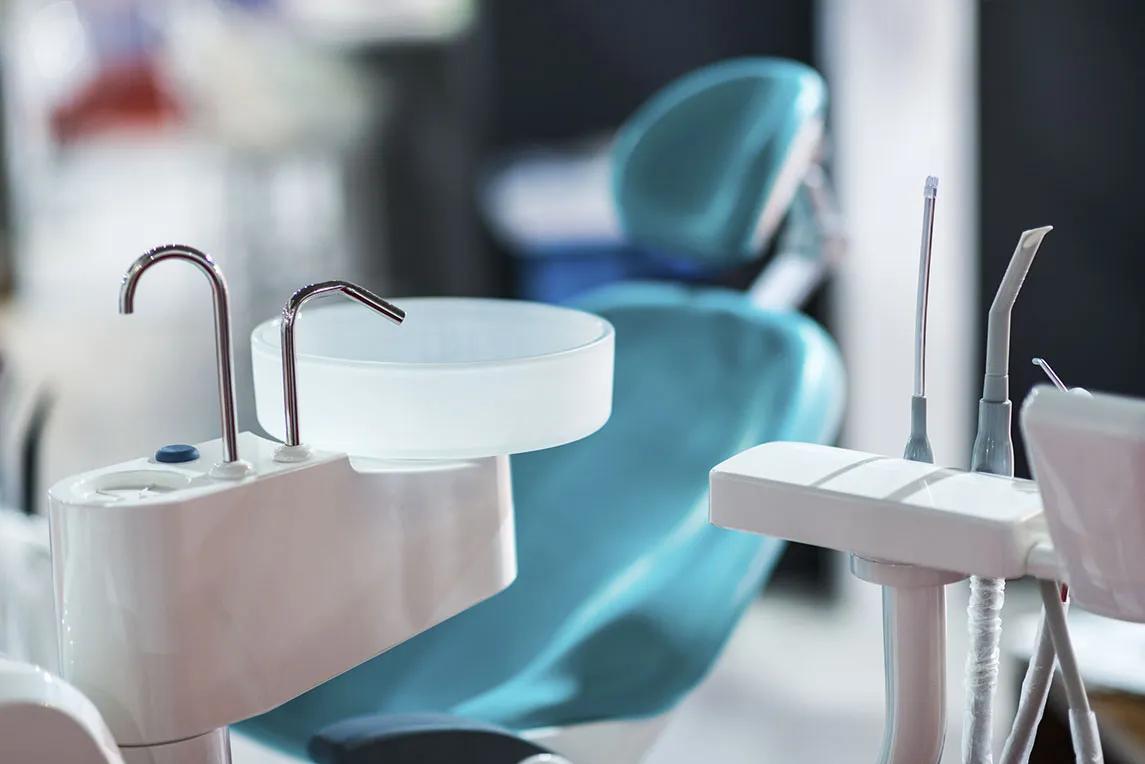How to Become a Dental Assistant in 8 Steps

Thinking about a career as a dental assistant? You’re not alone!
Dental assistants are a fast growing career path, with an expected 19% increase in employment by 2026 according to the U.S. Bureau of Labor Statistics (BLS). Dental assistants have good hiring prospects and the position can be very rewarding.
Use this guide to help answer some frequently asked questions about everything from how to find the right program to the employment details for dental assistants.
This guide covers a lot of useful information about becoming a dental assistant, so bookmark it for future use!
What is a Dental Assistant?
A dental assistant is someone who helps run a dentist’s office. This position may include a variety of tasks from patient care to administrative duties.
Dental assistants work alongside dentists and dental hygienists. Most dental assistants work in dentist’s offices assisting general dentists or specialists. There are also occasional positions available in doctor’s or government offices, health departments, or dental schools.
It’s common for dental assistants to work full-time, though some offices might offer part-time options. About a third of dental assistants work part-time, according to the BLS.
Flexible schedules are sometimes possible for dental assistants so this can be a good career option for someone with a family. Evening or weekend work hours might be required depending on the employer.
Dental assistants often wear scrubs or other types of protective clothing to work. They also need to wear safety items like gloves, surgical masks, and safety glasses to protect themselves during procedures.
What Does a Dental Assistant Do?
Each dentist’s office is different, so the exact tasks of a dental assistant will vary based on the needs of the employer and the legislation in the state where you work. Dental assistants may be asked to help with administrative tasks such as:
- Scheduling appointments for patients
- Assisting patients with billing and payments
- Record-keeping for dental treatments
Dental assistants may also help with varying aspects of patient care, such as:
- Getting patients ready for dental procedures
- Preparing the work area
- Making patients feel comfortable
- Sterilizing equipment before dental procedures
- Handing dentists the tools and equipment needed during procedures
- Drying patients’ mouths with a suction hose during procedures
- Educating patients in good oral hygiene habits
- Processing X-rays with supervision from a dentist
- Completing lab tasks as needed by dentist
In some states, dental assistants may be able to perform procedures like fluoride application and coronal polishing, according to the BLS.
Dental Assistant Job Outlook
A dental assistant is a good option for people who want a versatile career in a growing field. Dental assistants are projected to have a 19% growth in employment by 2026, according to the BLS.
One of the reasons why dental assistants are so in demand is because of how far dental practices have come. Baby boomers are living longer and keeping more of their teeth than the generations before them did. This leads to a continued need for good dental care.
Since dental assistants are being hired at faster than average rates, now is an opportune time to pursue this career path.
Dental Assistant Job Options
Dental assistants might have varying titles depending on the specific responsibilities of the role or the naming convention of the state.
Some job options in this field include:
- Certified Dental Assistant (CDA)
- Registered Dental Assistant (RDA)
- Certified Registered Dental Assistant
- Expanded Function Dental Assistant
- Expanded Duty Dental Assistant (EDDA)
- Surgical Dental Assistant
- Oral Surgery Assistant
- Orthodontic Technician
- Orthodontic Assistant
Is a Career as a Dental Assistant a Good Fit For You?
As you consider whether or not to pursue a career as a dental assistant, there are a number of things to consider. Aside from the job-specific elements like pay, scheduling, and job outlook, there are also soft skills that dental assistants should have.
Here are some questions to ask yourself if you’re considering a career as a dental assistant:
- Am I able to follow precise instructions?
- Do I like working with people?
- Can I stay calm and help others stay calm during potentially stressful situations?
- Am I organized and meticulous?
- Do I have good communication skills for both listening and speaking?
- Can I pay close attention to details?
- Are my interpersonal skills among my strengths?
If you’ve answered yes to the questions above, you may find that becoming a dental assistant would suit your personality and skill set.
How Long Does it Take to Become a Dental Assistant?
One of the reasons dental assistant is a popular career choice is because it’s a growing career field that doesn’t take too long to train for.
It can take anywhere from nine months to two years to become a dental assistant. The exact timeline will depend on which program you choose, the state that you live in, and your individual pace as a student.
If you graduate from a program that offers hands-on learning opportunities, you might be able to get hours of real-world experience or on-the-job training during the course of your studies.
It may also help to find a program that offers resume help, interview coaching, and assistance with pursuing a job.
How to Become a Registered Dental Assistant
Education is often the most direct path if you want to become a registered dental assistant. Occasionally work experience may serve as on-the-job training. The specific job requirements and necessary certifications to become a registered dental assistant vary by state.
For example, some states require dental assistants to get the appropriate degree or certificate and pass an exam. Others might require you to graduate from an accredited program. Always check the dental assistant job requirements in your state before choosing a program.
Employers often want dental assistants who have been trained for all of the various duties that the job requires. So students will want to learn dental sciences, office-related skills, clinical practices, and radiography.
Can You Get a Dental Assistant 2-Year Degree Online?
There are online and in-person options for dental assistant degrees. However, there may be some coursework or labs that need to be completed in-person, depending on the program.
Some certifications may require in-person exams as well.
What Are the Requirements to be a Dental Assistant?
Employers may require a certificate, an associate degree, or relevant work experience, depending on the requirements of the state and the needs of the employer.
Some states also require dental assistants to pass an exam before they can work in the field.
Is There Specific Licensure Needed to Become a Dental Assistant?
Whether or not licensure is needed to become a dental assistant varies by state. Some states require a degree or certificate from an accredited program to become a dental assistant.
Depending on the specifics of your dental program and the laws in your state, you may need additional certifications before you begin work. For example, some programs include radiology in their curriculum. But if your program did not cover radiology, you might need an additional certification in that area to work as a dental assistant.
There also may be specific licensure needed in some states to work in certain specialties, like infection control. And if your state allows dental assistants to perform expanded functions like coronal polishing, additional certifications may be required. Dental assistants may also need to maintain certification in CPR (cardiopulmonary resuscitation), depending on the state.
Always check the requirements in your state before you begin a dental assistant program to make sure that you choose the right one. A certification from one state may or may not apply to a different state, depending on the legislative requirements.
Remember that legislation can also change over time. So if you look into becoming a dental assistant but decide to wait to enroll, the certification requirements or other legislative details may change by the time you begin. Take a moment to go over the current requirements in your state before you enroll.
Also, check to see if there are ongoing requirements to keep your licensure. Some states have continuing requirements to maintain licensure.
Classes and Coursework Needed to Become a Dental Assistant
Dental assistant programs include coursework that covers both the administrative and dental assisting parts of the position. Programs often combine classroom learning, work in a laboratory, and supervised hands-on practice.
Classes cover everything dental assistants need to know about a patient’s gums, teeth, jaws and all parts of the inside of a mouth. Students also learn about all of the dental instruments needed for the various procedures that dentists perform.
Dental assistant students also learn about basic medical procedures like first aid and CPR plus how to prevent infections in the mouth.
Dental assistants will take classes on topics like:
- Dental office management
- Dental terminology
- Tooth morphology
- Preventative dentistry
- Infection control
- Dental radiology
- Anatomy and physiology
- Medical terminology
- Health and nutrition
- Vital signs
Dental assistant programs sometimes include expanded functions such as sealant placement, coronal polishing, and how to fabricate and remove temporary crowns.
Students should get hands-on experience to learn how to get patients ready for treatment and assist dentists during procedures. Dental programs also cover the administrative aspects of the job like handling billing and insurance.
Programs that include working in an actual dentist’s office can give students tangible experience in the field.
Technology Skills Needed to Become a Dental Assistant
Since dental assistants perform some administrative tasks, they have to learn how to use certain software programs. For example, accounting software like Quicken might be used for billing tasks. Microsoft Office programs like Word or Excel may be required for certain jobs.
There may be medical software needed for the job, as well. Depending on the position, options could include:
- Carestream Dental software
- Eaglesoft Practice Management software
- Dentrix software
Some of the technology skills and programs may be covered during your dental assistant education. Others may be taught on the job once you’re hired.
How Much Does a Dental Assistant Make an Hour?
Dental assistants in dentist’s offices made a median hourly wage of $18.59 per hour as of May 2017, according to the BLS. That is a median annual salary of $38,680.
The top 90% of earners in the dental assistant field made a median hourly wage of $25.54 per hour, which is a median annual salary of $53,130. Meanwhile, the bottom 10% of earners in this field made $12.58 per hour, or $26,170 per year.
Where Do Dental Assistants Work?
While a majority of dental assistants work at dentist’s offices, there are other job options available at doctor’s offices or outpatient care centers. Some dental assistants work in government offices or for colleges or universities. There are also specialty positions and work in psychiatric and substance abuse hospitals, according to the BLS.
The BLS shows that dental assistants may have different earnings depending on where they are employed. Here are the median earnings by employer:
- Dentist’s office: $18.59 per hour, $38,690 per year
- Physician’s office: $17.43 per hour, $36,250 per year
- Outpatient care centers: $18.55 per hour, $38,590 per year
- Government positions (federal executive branch): $20.01 per hour, $41,630 per year
- Universities and colleges: $18.99 per hour, $39,500 per year
The top paying industry for dental assistants is home healthcare services with a median annual wage of $43,600, which is $20.96 per hour. Specialty positions and state government jobs were the next highest paying industries for dental assistants, earning median wages of $43,010 and $42,850, respectively.
Keep in mind that these higher paying positions only represent a small percentage of the jobs in the field. For example, the number of dental assistants who work in specialty positions or state government jobs is less than one percent of the overall dental assistant positions. Ninety-one percent of dental assistants work in dentist’s offices, according to the BLS.
How Much Does It Cost to Become a Dental Assistant?
The cost of a dental assistant education varies based on the type of program you enroll in. There could be different costs for certificate programs than associate degree programs. The state you live in could also impact the price of your dental assistant training.
Keep in mind that some dental assistant programs might have additional fees for things like registration, labs, class supplies, and exams.
Reach out to the student services department of your dental assistant school to see what sort of financial aid is available. Federal financial aid can help cover the costs of your program, class materials, and other related expenses, depending on your eligibility.
Student loans might also be available to help eligible students cover costs that are not covered by financial aid. And students should also look into additional tuition assistance options, like scholarships and tuition reimbursement from an employer.
What Qualifications Do You Need to be a Dental Assistant?
Job requirements for dental assistants could vary on a state-by-state basis. Typically, employers will want you to have a diploma or two-year degree to become a dental assistant. You may also need to pass an exam depending on state requirements.
Regardless of the education requirements, employers also look for dental assistants with the qualities needed to excel at the job. According to the BLS, dental assistants can use skills like:
- Ability to stay organized and keep dental tools at hand for dentists
- Close attention to detail to follow all legislative rules and best practices
- Strong interpersonal skills to help work well with patients and dentists
- Good with their hands for delicate dental procedures
- Excellent communication and listening abilities
What to Look for in a Dental Assistant Training Program Checklist
When you’re ready to take the first step toward becoming a dental assistant, you’ll need to find the right program. Use this checklist to help guide you to a dental assistant training program that meets your needs:
- Will the program work with your schedule?
- Does the program prepare you for the certification exam needed in your state?
- Will you get personalized attention during the program?
- Does the program teach you the necessary skills to begin work as a dental assistant after graduating?
- Is there help with resume writing and job interview preparation in the program?
- Does the program offer assistance with your job search?
- Is there financial aid available for those who qualify?
- Does the program offer opportunities for hands-on learning experience?
Getting Hired as a Dental Assistant
Aside from the proper education, one of the best ways to get hired as a dental assistant is by following best practices for applying for a job. This includes a strong resume, stellar interview, and positive follow-through.
When you create a resume, keep in mind that 75% of hiring managers use applicant tracking programs, according to a recent study. This means that you need to customize your resume so that it includes the keywords that your potential employer is looking for.
An easy way to do this is to make sure that your resume includes some of the same language as the job listing. Often the skills and job requirements mentioned in the job posting are the same ones that employers use for their applicant tracking software.
After you complete your dental assistant education, your work experience in the field will probably be limited to the hands-on training that you participated in during your program. If that’s the case, your resume should be built around your education and training.
Include the skills you learned, the job experience you gained, and any externships you participated in. You should also include the specifics of your degree/diploma and/or certifications.
Even with a stellar resume, you will still need to ace the job interview. Remember that even if you meet the job qualifications, employers want to make sure that you’ll be a good culture fit for their team.
Since dental assistants work so closely with dentists and patients, personality is a major part of the job. So when you go for your interview, you’ll want to let your personality shine.
Be friendly and confident. If you come across too meek or shy, your employer may think you’re not able to handle patient interaction. Sit up straight, maintain eye contact, and be yourself!
Keep a list of references ready in case the potential employer asks. Make sure you speak to your references beforehand so they will be ready to sing your praises!
After a job interview, send handwritten thank-you notes to every person who interviewed you. Thank them for taking the time to meet with you and gently reinforce why you’d be a good fit by referencing something from the interview.
Although you’ll probably be very eager to find out where you stand after an interview, you don’t want to be overbearing. Ideally, you should ask about the follow-up process as the interview ends.
So if the potential employer mentions that they will let you know within a week, don’t start calling before that time. If they tell you to follow up with a specific person, then do it. Whatever their hiring process is, respect it.
Even if you’re not hired, remain respectful and thank the interviewer for considering you. Future opportunities might arise, so it’s smart to end on a positive note. You could also ask the interviewer if there is anything you need to improve upon in the future.
Don’t get discouraged if you don’t get the job. Dental assistants are in demand, so learn from the experience and use it to help you prepare for your next interview.
The 8 Steps to Becoming a Dental Assistant
Your journey to becoming a dental assistant starts in eight simple steps. Depending on where you live and the dental assistant guidelines in that state, your path could vary. But the basic path entails finding a school, getting trained, finding a job, and getting hired. Sounds simple, right?
While the exact steps may vary based on location, here is a general guide to the steps you need to take to become a dental assistant.
1. Find out the specific requirements for your state. Always begin by finding out the rules for the state you live in. Some states require certification or have education requirements. Others might accept work experience or offer on-the-job training, though this is not as common.
2. Choose the appropriate dental assistant program. Once you know what your state requires, you can research and find dental assistant education options to meet your needs. Use the checklist in this guide to narrow down your choices and find a program that has everything you’re looking for.
3. Enroll and begin your dental assistant training. After you find the program for you, it’s time to enroll and get started. Don’t forget to look into scholarships and financial aid options during the enrollment process to see if you qualify.
4. Get hands-on practice with real patients. During your dental assistant training, you’ll likely have the opportunity to get some real-world experience. This might be an externship, or it could be rolled into the curriculum of the program. The opportunity to work in a real physician’s office can help you put your education into practice and prepare you for the workforce. Plus, potential employers often look for dental assistants who have some experience with patients in an office setting.
5. Graduate and pass the certification exam. If you live in a state that requires certification, you’ll have to pass the exam. Your program should prepare you for the test, so don’t worry! Once you’re certified, take a moment to celebrate before the job search begins. You earned it!
6. Prepare your resume and begin the job search. Once you’re properly trained and certified, it’s time to begin the job hunt. Your school may be able to help you prepare your resume so it’s optimized to help highlight your skills. Some schools even offer assistance with your job search, so take advantage of this if it’s offered.
7. Interview for a dental assistant job. When you find a potential employer and apply for a position, your last step before getting hired is a stellar interview. If your school offers any job interview preparation, definitely get in some practice before the real thing. This preparation can be the difference between going into an interview feeling overwhelmed and going in confident with your abilities.
8. Get hired and begin your career as a dental assistant! After training, certification, and nailing your interview, all that’s left is getting an official job offer. Then you’re ready to begin your career as a dental assistant!
Get Started as a Dental Assistant
The right school is the first step to preparing yourself for a career as a dental assistant. After you find and enroll in a program that suits your needs, you’ll be on the right track for building the skills you need to become a dental assistant. Be sure to bookmark this guide to help you through every step of the process.
Request Information
Talk with us. Start your journey.
Complete this form and we'll call you to explore options at UMA and answer your questions. We'll also email you info on how to get started. We're with you at every step!
Request Information
Talk with us. Start your journey.
Complete this form and we'll call you to explore options at UMA and answer your questions. We'll also email you info on how to get started. We're with you at every step!
About the Author
 Christina DeBusk
Christina DeBuskChristina DeBusk is a freelance writer who has been providing health and wellness content to healthcare organizations such as the American Chiropractic Association and International Sports Sciences Association (ISSA) since 2011. She obtained her Bachelor of Science in Sociology from Central Michigan University, minoring in psychology. She has also earned several ISSA certifications, including Certified Personal Trainer and Certified Nutrition Specialist, achieving the status of Elite Trainer.
Related Content






